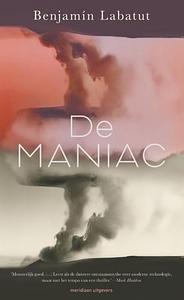Take a photo of a barcode or cover
adventurous
challenging
informative
inspiring
tense
medium-paced
Plot or Character Driven:
Character
Strong character development:
Complicated
Loveable characters:
Complicated
Diverse cast of characters:
Complicated
Flaws of characters a main focus:
Yes
challenging
reflective
medium-paced
Plot or Character Driven:
Character
Strong character development:
Yes
Loveable characters:
No
Diverse cast of characters:
No
Flaws of characters a main focus:
Yes
dark
informative
reflective
medium-paced
Plot or Character Driven:
Character
Strong character development:
Complicated
Loveable characters:
No
Diverse cast of characters:
Yes
Flaws of characters a main focus:
Yes
Deep, thoughtful and relevant. Love the multiple person perspective storytelling.
emotional
inspiring
reflective
tense
fast-paced
Plot or Character Driven:
Character
Strong character development:
Complicated
Loveable characters:
No
Diverse cast of characters:
No
Flaws of characters a main focus:
Yes
This is the best book I've read in a long time, maybe because I work in computer science and this novel adds faces to the mathematical concepts that are central to my world. I loved the juxtaposition of the many different stories, half Oppenheimer and half Kasparov vs. IBM. Absolutely delicious. A fictional book written about AI that gets it.
Just like When We Cease to Understand the World , The MANIAC is a work of fiction based on fact. The title refers to a computer that was created in Los Alamos and named Mathematical Analyser, Numerical Integrator and Computer or simply MANIAC. The book's main focus is on Hungarian-American physicist and computer scientist John von Neumann. Just like in his previous book, Labatut is interested in scientific discoveries (in this case the book's focus lies on the Manhattan Project, creation of the world's first computer and AI) and the madness behind it. All scientists presented in the book actually existed and some of them were driven to madness by their obsession with progress and discovery. Labatut masterfully weaves all elements in this book to create a book that grips you from the start and doesn't let go.
I would recommend this book to almost anyone. It's a "must-read" if you're a fan of biographical fiction or literary fiction. Some portions of this book read like narrative nonfiction, so some readers might appreciate that. You will learn so much about the scientific method, ethics of science and the troubling advent of artificial intelligence. It is a haunting book that will make you think about what human beings are willing to sacrifice for science. It is a unique book. There is truly nothing else out there quite like it. 5 stars.
I would recommend this book to almost anyone. It's a "must-read" if you're a fan of biographical fiction or literary fiction. Some portions of this book read like narrative nonfiction, so some readers might appreciate that. You will learn so much about the scientific method, ethics of science and the troubling advent of artificial intelligence. It is a haunting book that will make you think about what human beings are willing to sacrifice for science. It is a unique book. There is truly nothing else out there quite like it. 5 stars.
Entiendo todo lo que propone: el nudo que desata el centro de nuestro tiempo, la intención de pensarlo para entender el presente. El hombre que se imaginó por primera vez el algoritmo y sus alcances. Pero ni si brutalidad ni su locura ni los caminos terribles de cada uno de sus inventos me hicieron nada. No pude no ver en cada frase los intentos constantes de la consciencia que organiza el texto de revestir todo de cierta épica, como si estuviera forzando la emoción y la furia. En el fondo no me pareció genial la genialidad.
i would’ve been OBSESSED with this book when i was like 17 and really into the history of science (for the feuds and the gossip)
At first glance, The MANIAC by Benjamin Labatut, a fictional biography of scientist and mathematician John von Neumann was an intimidating (but intriguing) read. But on the page it is a contemplative, beautifully written and captivating tale of the power and burden intelligence carries.
Beginning a prologue focusing on physicist Paul Ehrenfest, Labatut establishes a theme critical to The MANIAC: the weight of knowledge that has world-changing implications (for better or for worse). Told in the third person by an unnamed narrator, this section hit me hard, and immediately establishes the novel's themes.
The next and largest section focuses on von Neumann, whose other-wordly intelligence was both a blessing and a curse. A prodigy in several fields who verged on obsessed, he sought to understand the role of prediction, choice and autonomy in science and mathematics, eventually pioneering AI. Told through the voices of those in his life, we explore his questionable behavior and actions, and see them as more layered and nuanced. This device of the characters (I say characters as Labatut has noted this is a work of fiction, even though they're based on real people) sharing their stream of conscious experience suits this section well and serves as a balance for the scientific, mathematical elements (which are written in a digestible way).
The final section sees von Neumann's work and its implications as AI battles Go champion Lee Sedol. This section delves deep into one man's psychological experience of competing with AI, and the ramifications that come along with that (personal and societal).
As its synopsis notes, The MANIAC is a literary triptych. And like any triptych, there are elements that tie the three parts together. Even as you move forward in the story, you're compelled to look back and forth through time making connections just as you do with artwork made of multiple panels.
The MANIAC is an exciting, relevant and unique book. I recently heard Labatut say that "anything that comes out of a writer is fiction." It's a poignant comment and one that reinforces why unique storytellers are important, and makes The MANIAC stunning and unforgettable.
Beginning a prologue focusing on physicist Paul Ehrenfest, Labatut establishes a theme critical to The MANIAC: the weight of knowledge that has world-changing implications (for better or for worse). Told in the third person by an unnamed narrator, this section hit me hard, and immediately establishes the novel's themes.
The next and largest section focuses on von Neumann, whose other-wordly intelligence was both a blessing and a curse. A prodigy in several fields who verged on obsessed, he sought to understand the role of prediction, choice and autonomy in science and mathematics, eventually pioneering AI. Told through the voices of those in his life, we explore his questionable behavior and actions, and see them as more layered and nuanced. This device of the characters (I say characters as Labatut has noted this is a work of fiction, even though they're based on real people) sharing their stream of conscious experience suits this section well and serves as a balance for the scientific, mathematical elements (which are written in a digestible way).
The final section sees von Neumann's work and its implications as AI battles Go champion Lee Sedol. This section delves deep into one man's psychological experience of competing with AI, and the ramifications that come along with that (personal and societal).
As its synopsis notes, The MANIAC is a literary triptych. And like any triptych, there are elements that tie the three parts together. Even as you move forward in the story, you're compelled to look back and forth through time making connections just as you do with artwork made of multiple panels.
The MANIAC is an exciting, relevant and unique book. I recently heard Labatut say that "anything that comes out of a writer is fiction." It's a poignant comment and one that reinforces why unique storytellers are important, and makes The MANIAC stunning and unforgettable.
challenging
dark
funny
informative
reflective
tense
fast-paced
Loveable characters:
No
Diverse cast of characters:
No
Flaws of characters a main focus:
Yes






